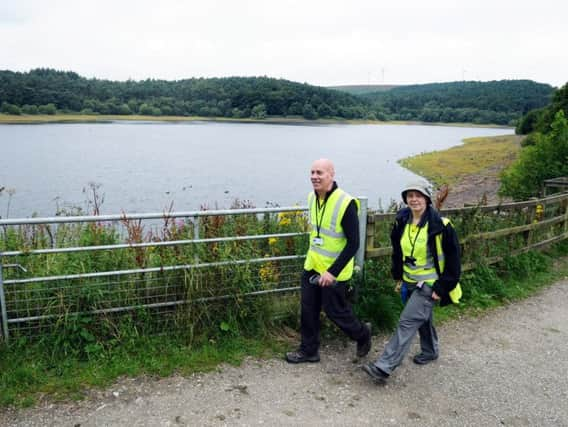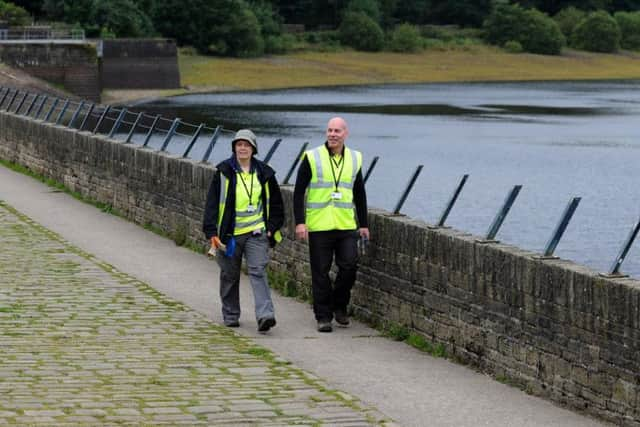Rangers patrolling Calderdale beauty spots in a bid to prevent drownings and devastating fires


They are tragic but all-too-familiar stories at this time of year – young people losing their lives after getting into trouble while swimming in open water at reservoirs, lakes and rivers.
In the past few months, two teenage boys have drowned, while two young girls had to be rescued from the Sparth Reservoir in Yorkshire in June.
Advertisement
Hide AdAdvertisement
Hide AdIn the same month, 16-year-old Paul Lawson died after getting into difficulties while swimming in Greenbooth Reservoir in Rochdale, while on the following day, 15-year-old Spencer Hurst drowned after going swimming in a lake with friends close to his home in Walsall.


The statistics are stark; more than 300 people died in the UK in 2015 after tripping, falling or simply underestimating the risks associated with being near water. And in the past four years, West Yorkshire Fire & Rescue Service has responded to more than 180 water-related incidents – 10 of which turned out to be fatal.
But helping to reduce the risk of people drowning by warning them not to go swimming in reservoirs is all part of the wide-ranging remit of two new summer rangers taken on by Calderdale Council’s Countryside Service.
Jeff Platts and Helen Mariott are working on Fridays, Saturdays and Sundays to enforce reservoir water safety, as well as tackling anti-social behaviour, illegal camping and littering issues at 13 sites across Calderdale, including Mixenden reservoir, Baitings and Ryburn, Gorple, Widdop and Ogden Water Country Park.
Advertisement
Hide AdAdvertisement
Hide AdThe 13-week project started in July this year and the rangers are on now on hand to advise on the dangers of swimming in reservoirs and to discourage unauthorised access to reservoirs.


Platts says it is a privilege to do the job and help improve safety levels. “I love the outdoors and feel like I am giving something back really. We are trying to keep people safe as reservoirs can be quite dangerous.”
Their work also includes carrying out day-to-day repairs at the sites and keeping pathways and access routes clear, safe and well-signed for visitors.
The roles are being funded in part by Yorkshire Water as part of the company’s commitment to look after its moorlands and reservoirs, many of which are popular recreational spots.
Advertisement
Hide AdAdvertisement
Hide AdYorkshire Water is the second-largest landowner in the county after the National Trust.
Somewhat ironically, its sites are generally more open to the public now since the days of the privatisation of the water industry than they were before when it was state-owned and locations were often closed off.
The Mixenden reservoir, in the village of the same name on the outskirts of Calderdale, is particularly recognised by Yorkshire Water as a site where there are problems with people going swimming – thanks in part to its proximity to local houses.
Tom Underwood, a spokesman for Yorkshire Water, says: “On a hot day, it is enticing for people to jump in the water. There can be quite dangerous underwater currents and very cold, so there is the risk of cold water shock.”
Advertisement
Hide AdAdvertisement
Hide AdBut at Ogden Water, a popular spot which attracts around 250,000 visitors per year, officials have come up with a quirky and environmentally-friendly solution to discourage people from entering the water.
Robin Dalton, from the council’s countryside service, says: “Water safety is such a key issue for regulating a site like this. One of the measures we have taken as an authority is to use recycled Christmas trees as a wildlife border all the way around the reservoir.
“It is quite an alternative idea but it has been going at least since the early 1990s. Often we get thousands of Christmas trees donated.”
Another part of Jeff and Helen’s role is to educate people on the devastating impact that moorland fires can have on the landscape and its wildlife.
Advertisement
Hide AdAdvertisement
Hide AdOgden Water suffered its own blaze back in 2011, when the fire on nearby moorland was so serious, a helicopter was used to collect water from the reservoir to douse the flames. #
Fires damaged four square kilometres of moorland and caused considerable damage to rare wildlife and vegetation. Two teenagers were subsequently arrested on suspicion of arson.
Preventing a repeat of that situation is a key part of the rangers’ job and they go out on patrol to ensure people aren’t having barbecues on the moors – something that is an accidental but regular cause of fires starting.
Platts says: “We have to deal with anti-social behaviour, illegal camping and campfires. We had a big camp fire out in the woods here which was obviously very dangerous.”
Advertisement
Hide AdAdvertisement
Hide AdBut he adds one of the most persistent problems the pair have to deal with is rubbish and fly-tipping at the beauty spots they patrol.
Platts and Mariott have come across everything from bags of dog waste stuck on barbed wire on fences to car tyres dumped in woods. He says: “I get shocked by the amount of rubbish you actually clear from certain sites. People are just dropping rubbish. It is sad that it happens but that is the reason we are needed.
“There is some fly-tipping , it is not a major problem but because this job is only a three-month contract, there is quite a big gap over the winter for it to build up.”
Platts, who also works for the council’s Bikeability scheme encouraging more people to cycle, was a ranger last year as well after the 54-year-old moved from Leeds to Calderdale.
Advertisement
Hide AdAdvertisement
Hide Ad“I have gone from the city to the countryside. It is not so far but in some ways it feels a million miles away. “I was always outdoors in the woods when I was a kid, playing and stuff. It is just beautiful countryside, who wouldn’t want a job like this?”
His colleague Mariott is a summer ranger for the first time this year and says she is enjoying the job after previously working as an international administrations officer for Bradford College, before being made redundant in 2014 and deciding to change her career path.
Prior to her role as a ranger, she did a number of volunteer jobs designed to keep her in the great outdoors, for organisations like the council’s countryside service and the North York Moors National Park Authority.
The 52-year-old, from Thornton, says: “I didn’t want to sit in an office any more. I love being outside.
Advertisement
Hide AdAdvertisement
Hide Ad“We do basic maintenance as part of the job but you have also got to be good at face-to-face public interaction. It is no good if you are a bit of a recluse!”
Platts says that in addition to the joys of being able to spend time outdoors in beautiful locations, meeting members of the public is another rewarding part of the role.
“Last week, we were walking and we approached by quite a few members of the public thanking us for picking up the litter and keeping things tidy.
“It is great because you do meet lots of interesting people. It would be great to do this full-time.”